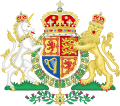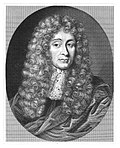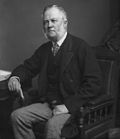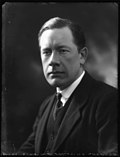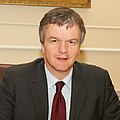Top Qs
Timeline
Chat
Perspective
Secretary of State for Scotland
Member of the Cabinet of the United Kingdom From Wikipedia, the free encyclopedia
Remove ads
The secretary of state for Scotland (Scottish Gaelic: Rùnaire Stàite na h-Alba; Scots: Secretar o State fir Scotland), also referred to as the Scottish secretary, is a secretary of state in the Government of the United Kingdom, with responsibility for the Scotland Office. The incumbent is a member of the Cabinet of the United Kingdom. The Secretary of State for Scotland serves as the custodian of the Scottish devolution settlement as outlined in the Scotland Act 1998, and represent Scottish interests within the UK Government as well as advocate for UK Government policies in Scotland. The secretary of state for Scotland is additionally responsible for partnership between the UK Government and the Scottish Government, as well as relations between the Parliament of the United Kingdom and the Scottish Parliament.[3]
Much of the secretary of state for Scotland's responsibility transferred to the office of the first minister of Scotland upon the establishment of a new Scottish Executive, since renamed the Scottish Government, and a new devolved Scottish Parliament in 1999 following the Scotland Act 1998.[4]
The office holder works alongside the other Scotland Office ministers. The secretary of state for Scotland is supported by their deputy, the parliamentary under-secretary of state for Scotland. The incumbent is Douglas Alexander, following his appointment by Prime Minister Keir Starmer in September 2025. The corresponding shadow minister is the shadow secretary of state for Scotland.
Remove ads
Overview
Summarize
Perspective
History of office
Acts of Union, 1707
The post was first created after the Acts of Union 1707 created the Kingdom of Great Britain from the Kingdom of England and the Kingdom of Scotland. It was abolished in 1746, following the Jacobite rising of 1745. Scottish affairs thereafter were managed by the lord advocate until 1827, when responsibility passed to the Home Office. In 1885 the post of secretary for Scotland was re-created, with the incumbent usually a member of the Cabinet. In 1926 this post was upgraded to a full secretary of state appointment.
Devolution, 1999
After the 1999 Scottish devolution, the powers of the Scottish Office were divided, with most transferred to the Scottish Government or to other British government departments, leaving only a limited role for the Scotland Office. From June 2003 to October 2008, the holder of the office of secretary of state for Scotland also held another Cabinet post concurrently, leading to claims that the Scottish role was seen as a part-time ministry.
Functions
Reduced responsibility
With the advent of legislative devolution for Scotland in 1999, the role of secretary of state for Scotland was diminished. Most of the functions vested in the office since administrative devolution in the 19th century were transferred to the newly established Scottish Ministers upon the opening of the Scottish Parliament, or to other UK government ministers. Most of the functions and powers of the secretary of state for Scotland transferred to the first minister of Scotland as the head of the Scottish Government. Donald Dewar served as the first first minister of Scotland between 1999–2000,[5] having previously served as the secretary of state for Scotland between 1997–1999.[6]
However, the secretary of state does represent Scotland in the Cabinet of the United Kingdom on matters that are not devolved to the Scottish Parliament, and also holds Scotland Questions on the first Wednesday of every month between 11:30 am and 12 noon, when any member of Parliament can ask a question on any matter relating to Scotland. However, devolved issues are not usually raised by MPs, as these are decided solely by Scottish Government policy, and influenced, discussed and voted on by members of the Scottish Parliament in Edinburgh. Moreover, the secretary of state for Scotland cannot introduce any bill or legislation in the UK Parliament relating to a devolved matter under the convention that the UK Government will not introduce legislation on devolved areas without the agreement of the Scottish Parliament.[7] The secretary of state is also the group leader of the Scottish MPs from the government party.
Scottish Government collaboration

The office mainly acts as a go-between for the UK and Scottish Governments and Parliaments.[8] However, due to the secretary's position as a minister in the British government, the convention of Cabinet collective responsibility applies, and as such the post is usually viewed as being a partisan one to promote the UK government's decision-making in Scotland, as adherence to the convention precludes doing anything else.
With the rise of the Scottish National Party (SNP) in both the Scottish Parliament and the British Parliament and the resultant interest in Scottish Independence, the secretary of state's role has also subsequently increased in prominence. The Scotland Office itself has received a cumulative increase in budget of 20% from 2013 to 2017, with a 14.4% increase in 2015/16 alone.[9]
Responsibilities
The UK government's website lists the secretary of state for Scotland's responsibilities as being:
- The secretary of state for Scotland is the UK Government Cabinet Minister representing Scotland.
- They act as the custodian of the Scottish devolution settlement.
- They represent Scottish interests within the UK Government
- They advocate for the UK Government’s policies in Scotland.
- They also promote partnership between the UK Government and the Scottish Government, as well as relations between the UK and Scottish Parliaments.[10]

This seeming lack of responsibility has in recent years seen calls from opposition MPs for the scrapping of the role and the Scotland Office.[11][9] Robert Hazell has suggested merging the offices of secretary of state for Northern Ireland, Scotland and Wales into one secretary of state for the Union,[12] in a department into which Rodney Brazier has suggested adding a minister of state for England with responsibility for English local government.[13]
More broadly, the UK Government advocates that all UK Government cabinet ministers with responsibility for a territorial secretary of state position are responsible for:[14]
- the smooth running of the devolution settlements and act as the lynchpin of the relationship between the devolved government and HM Government
- handling legislation as it affects the territory
- representing the territory’s interests in cabinet and cabinet committees
- responding to parliamentary interests in territorial affairs
- transmitting the block grant to the devolved administration
- supporting collaboration between HM Government and the devolved administration
- promoting the interests of the territory
Remove ads
List of Scottish secretaries
Summarize
Perspective
Secretaries of state for Scotland (1707–1746)
- John Erskine, Earl of Mar had served as Secretary of State of the independent Scotland from 1705. Following the Acts of Union 1707, he remained in office.
The post of secretary of state for Scotland existed after the Union of the Parliament of Scotland and the Parliament of England in 1707 till the Jacobite rising of 1745. After the rising, responsibility for Scotland lay primarily with the office of the home secretary, usually exercised by the lord advocate.
Office thereafter vacant.
Secretaries for Scotland (1885–1926)
The secretary for Scotland was chief minister in charge of the Scottish Office in the United Kingdom government. The Scottish Office was created with the post of secretary for Scotland by the Secretary for Scotland Act 1885.[15] From 1892 the secretary for Scotland sat in cabinet. The post was upgraded to full secretary of state rank as the secretary of state for Scotland in 1926.[16]
From 1885 to 1999, secretaries for Scotland and secretaries of state for Scotland also ex officio held the post of Keeper of the Great Seal of Scotland.[17] From 1999, the position of keeper of the Great Seal of Scotland has been held by the first minister of Scotland.[18]
Secretaries of state for Scotland (1926–)
Remove ads
Timeline

Notes
- Concurrently served as Secretary of State for Transport
- MP for Edinburgh Central until 2005; MP for Edinburgh South West thereafter
- Concurrently served as Secretary of State for Defence
See also
- First Minister of Scotland
- Secretary of State, a senior post in the pre-Union government of the Kingdom of Scotland
- Under-Secretary of State for Scotland, junior minister supporting the Secretary of State for Scotland
- Shadow Secretary of State for Scotland
- Secretary of State (Jacobite)
- Secretary of State for Northern Ireland
- Secretary of State for Wales
Notes
- Duke of Lennox in the peerage of Scotland
- MP for Forfar until 1909; created Baron Pentland 1909
- MP for Wick Burghs until 1918; MP for Roxburgh and Selkirk thereafter
References
External links
Wikiwand - on
Seamless Wikipedia browsing. On steroids.
Remove ads

